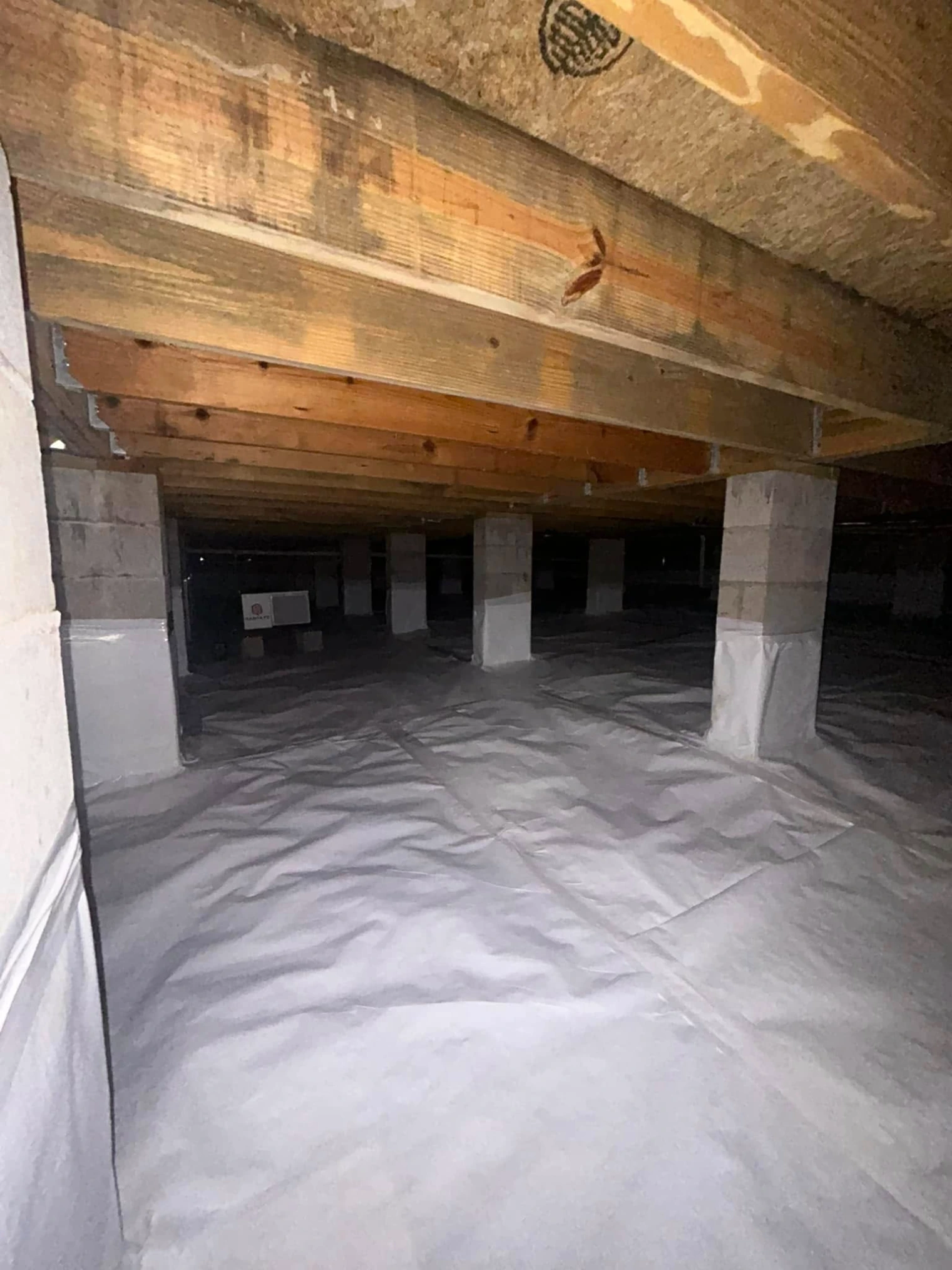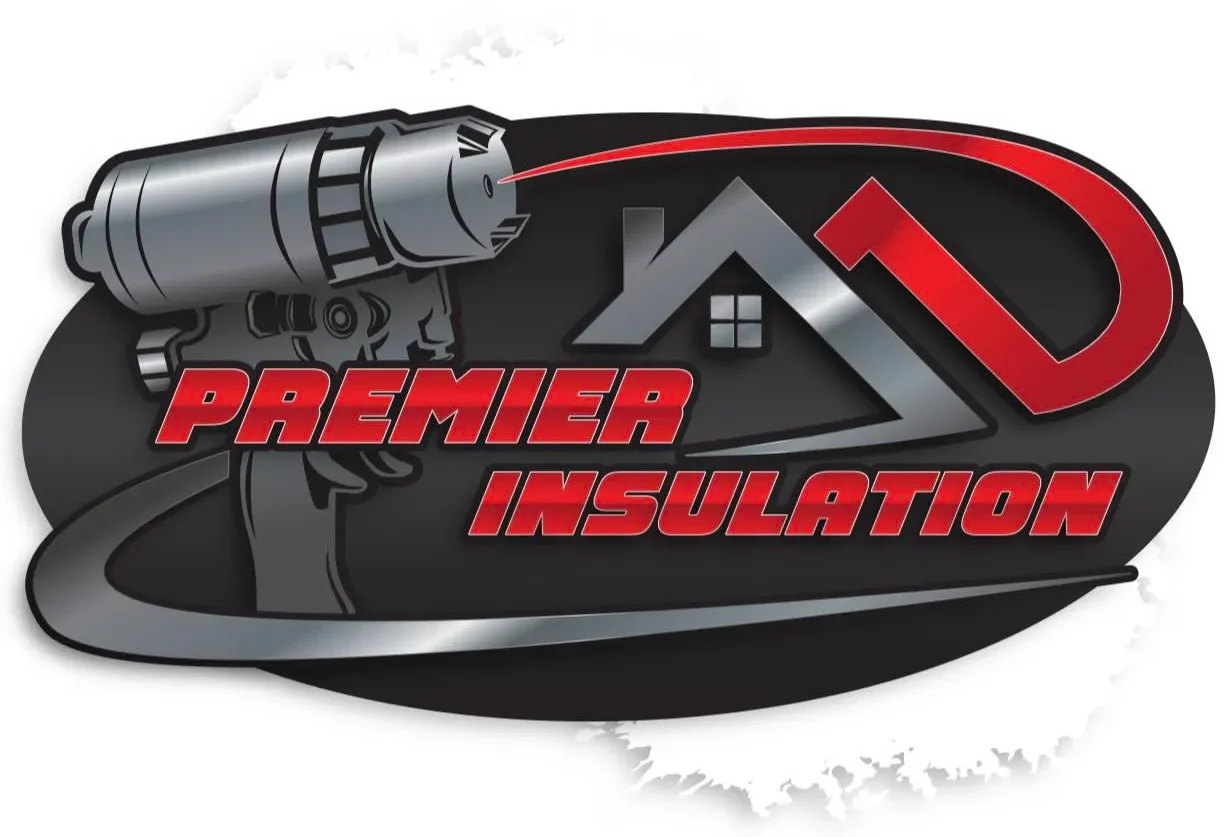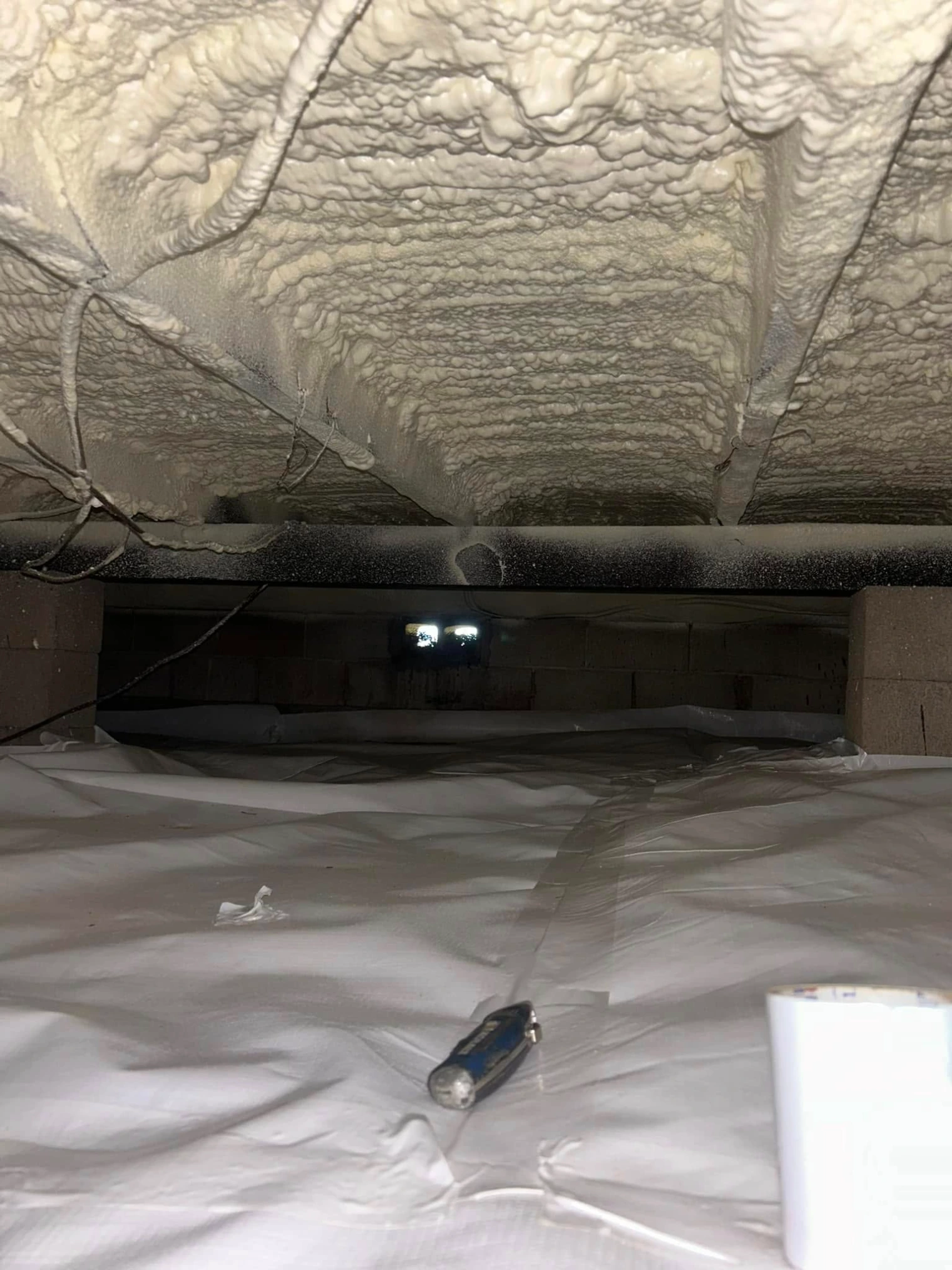Crawl space encapsulation becomes a smart choice in Colquitt County due to the region’s humid subtropical climate, which creates persistent moisture problems that lead to mold growth, structural damage, and energy inefficiency. This comprehensive moisture control solution transforms vented crawl spaces into conditioned environments by sealing all surfaces with vapor barriers, installing dehumidification systems, and creating controlled ventilation that prevents the 80-90% humidity levels common in South Georgia.
The decision proves particularly valuable for Colquitt County homeowners because the area experiences average annual rainfall of 49 inches, combined with high summer humidity that creates ideal conditions for moisture accumulation beneath homes. Professional encapsulation addresses these regional challenges while delivering measurable improvements in indoor air quality, energy efficiency, and structural preservation that justify the investment through reduced utility bills and maintenance needs.
Understanding Colquitt County’s Moisture Challenge
South Georgia’s climate creates unique challenges for crawl space management. The region experiences hot, humid summers with average temperatures reaching 90°F and relative humidity often exceeding 80%. These conditions, combined with clay-heavy soils common in Colquitt County, create perfect environments for moisture accumulation and vapor intrusion.
Traditional vented crawl spaces become problematic in this climate because outdoor air enters carrying moisture that condenses on cooler surfaces. The “stack effect” pulls this humid air upward into living spaces, carrying allergens, odors, and potentially harmful compounds. Ground moisture from the area’s clay soils adds another layer of complexity, as these soils retain water longer than sandy alternatives.
Bonus Tip: Check crawl space humidity levels during different seasons. Summer readings above 60% indicate immediate encapsulation needs, while winter readings above 50% suggest vapor intrusion problems that require professional assessment.
Regional Climate Impact Analysis
| Climate Factor | Colquitt County Average | Impact on Crawl Spaces |
|---|---|---|
| Annual Rainfall | 49 inches | Increased ground moisture and vapor pressure |
| Summer Humidity | 75-85% | Condensation on cool surfaces, mold growth |
| Winter Humidity | 65-75% | Continued moisture problems year-round |
| Average Temperature Range | 45°F – 90°F | Temperature differentials increase condensation |
| Soil Type | Clay-heavy | High moisture retention, slow drainage |
Encapsulation System Components
Effective crawl space encapsulation requires multiple integrated components that work together to control moisture, air movement, and temperature. The primary vapor barrier system uses reinforced polyethylene sheeting with sealed seams that covers all ground surfaces and extends up foundation walls. This barrier prevents ground moisture from entering the crawl space environment.
Dehumidification systems maintain optimal humidity levels between 30-50% regardless of outdoor conditions. These systems remove excess moisture from the air while providing controlled ventilation that prevents stagnation. Proper sizing calculations consider crawl space volume, regional humidity patterns, and seasonal variations specific to South Georgia.
Air sealing components address gaps around rim joists, penetrations, and foundation openings where outside air infiltrates. This comprehensive approach eliminates the pathways that allow humid outdoor air to enter and create moisture problems.
Technical Specifications for Optimal Performance
| Component | Specification | Purpose |
|---|---|---|
| Vapor Barrier | 20-mil reinforced polyethylene | Ground moisture prevention |
| Dehumidifier Capacity | 70-90 pints/day (typical) | Humidity control 30-50% |
| Air Sealing | Spray foam/caulk penetrations | Eliminate air infiltration |
| Insulation | R-13 to R-19 (walls) | Temperature regulation |
| Ventilation | Sealed system with controlled air exchange | Prevent stagnation |
Energy Efficiency Benefits
Encapsulated crawl spaces deliver significant energy savings in Colquitt County’s climate through multiple mechanisms. Eliminating the stack effect reduces the load on HVAC systems by preventing humid outdoor air from entering living spaces. This reduction typically translates to 10-20% lower cooling costs during summer months when air conditioning represents the largest energy expense.
Temperature stabilization provides year-round benefits by creating a buffer zone between ground temperatures and living spaces. Winter heating efficiency improves as floor temperatures remain more stable, reducing heat loss through flooring materials.
According to the Department of Energy, homes with properly encapsulated crawl spaces show average energy savings of 15-20% compared to traditional vented systems in humid climates like South Georgia.
Bonus Tip: Monitor utility bills for three months after encapsulation to document energy savings. Most homeowners see noticeable reductions in the first billing cycle, with maximum savings appearing after seasonal adjustments.
Structural Protection Advantages
Moisture control through encapsulation prevents the structural damage commonly seen in Colquitt County’s humid environment. Wood framing members maintain optimal moisture content below 19%, preventing rot, decay, and insect attraction. This protection extends the lifespan of floor joists, subflooring, and other structural components.
Foundation protection occurs through reduced hydrostatic pressure and improved drainage around foundation walls. The controlled environment prevents freeze-thaw cycles that can damage concrete and masonry foundations during occasional winter weather events.
Metal components like HVAC ductwork, plumbing, and electrical systems benefit from reduced corrosion in the controlled humidity environment. This protection translates to longer equipment life and fewer maintenance requirements.
Health and Indoor Air Quality Improvements
Encapsulation addresses indoor air quality concerns by eliminating the pathways that transport contaminants from crawl spaces into living areas. The controlled environment prevents mold growth, which reduces allergen exposure and respiratory irritation common in humid climates.
Radon mitigation benefits occur naturally through the comprehensive air sealing process. While Colquitt County shows relatively low radon levels compared to northern regions, encapsulation provides additional protection by preventing soil gas infiltration.
Pest control improvements result from eliminating the moisture and organic material that attract insects and rodents. The sealed environment creates an inhospitable environment for termites, carpenter ants, and other moisture-dependent pests common in South Georgia.

Things to Consider Before Making a Decision
Several factors determine whether encapsulation represents the optimal solution for specific properties in Colquitt County. Existing moisture problems require assessment to identify underlying causes before encapsulation begins. Properties with active plumbing leaks, inadequate exterior drainage, or foundation settlement need these issues resolved first.
Structural accessibility affects installation complexity and associated requirements. Crawl spaces with limited height, numerous obstructions, or difficult access points may require additional preparation work. Foundation condition assessment identifies any repairs needed before encapsulation begins.
Budget considerations should include long-term maintenance requirements for dehumidification systems and periodic system inspections. While encapsulation reduces overall maintenance needs, the mechanical systems require regular attention to maintain optimal performance.
Local building codes and permit requirements vary by municipality within Colquitt County. Some jurisdictions require permits for electrical work associated with dehumidifier installation or structural modifications during the encapsulation process.
Professional Services for Comprehensive Solutions
Premier Insulation provides specialized crawl space services designed for Colquitt County’s unique climate challenges:
- Crawl Space Encapsulation: Complete moisture control systems with vapor barriers, dehumidification, and air sealing tailored to regional humidity patterns and soil conditions.
- Crawl Space Mold Remediation: Professional mold removal and prevention strategies that address South Georgia’s persistent moisture challenges before encapsulation installation.
- Dehumidifier Installation: Properly sized humidity control systems with maintenance programs designed for optimal performance in high-humidity environments.
- Insulation Services: Comprehensive insulation solutions including spray foam and traditional materials optimized for encapsulated crawl space environments.
Common Questions About Implementation
How long does the encapsulation process take?
Most residential encapsulation projects in Colquitt County require 2-3 days for completion, depending on crawl space size and existing conditions. Properties requiring mold remediation or structural repairs need additional time for proper preparation.
What maintenance does the system require?
Dehumidifiers need filter changes every 3-6 months and annual professional inspections. Vapor barriers require visual inspection annually to identify any damage from settling or pest activity.
Does encapsulation work in all soil types?
The clay-heavy soils common in Colquitt County respond well to encapsulation, though properties with sandy soils may require additional drainage considerations. Professional soil assessment determines optimal system design.
Bonus Tip: Schedule encapsulation during fall or winter months when humidity levels are lower. This timing allows systems to establish optimal operating conditions before the challenging summer season begins.
Making the Right Choice for Your Property
Crawl space encapsulation represents a smart investment for Colquitt County homeowners facing persistent moisture problems, high energy bills, or indoor air quality concerns. The combination of regional climate challenges and soil conditions creates ideal scenarios where encapsulation delivers measurable improvements in comfort, efficiency, and structural protection.
Success depends on proper system design that addresses specific property conditions and regional climate factors. Professional assessment identifies the optimal combination of components needed to achieve long-term moisture control and energy efficiency goals.
Get Professional Assessment and Installation
Determining whether crawl space encapsulation fits your specific situation requires professional evaluation of existing conditions, moisture sources, and structural factors. Premier Insulation provides comprehensive assessments that identify optimal solutions for Colquitt County properties.
Contact Premier Insulation at (229) 554-3939 or premiereinsulationga@gmail.com to schedule a detailed crawl space evaluation. Professional assessment ensures proper system design and installation that delivers maximum benefits for your specific property and long-term goals.
Answers to Key Questions
What humidity levels indicate encapsulation needs?
Crawl space humidity consistently above 60% during any season indicates immediate encapsulation needs. Summer readings above 70% suggest severe moisture problems requiring comprehensive system installation. Winter humidity above 50% indicates vapor intrusion that professional encapsulation can eliminate.
How does encapsulation affect existing HVAC systems?
Encapsulation typically improves HVAC efficiency by eliminating the stack effect that forces systems to work harder removing humid air. Ductwork in encapsulated spaces operates more efficiently due to stable temperatures and reduced condensation risk. Some systems may require minor adjustments to optimize performance in the new environment.
Can encapsulation prevent all moisture problems?
Properly installed encapsulation eliminates ground moisture and controls humidity levels, but cannot address moisture from plumbing leaks, roof problems, or exterior drainage issues. These underlying problems require separate solutions before encapsulation installation begins.
What warranty coverage applies to encapsulation systems?
Professional encapsulation typically includes warranties on vapor barrier materials, dehumidification equipment, and installation workmanship. Coverage periods vary by component, with vapor barriers often carrying longer warranties than mechanical systems requiring regular maintenance.
How do I know if my crawl space needs immediate attention?
Visible mold growth, musty odors, standing water, or humidity readings above 60% indicate immediate professional assessment needs. Structural sagging, pest activity, or HVAC efficiency problems also suggest underlying moisture issues that encapsulation can address effectively.


